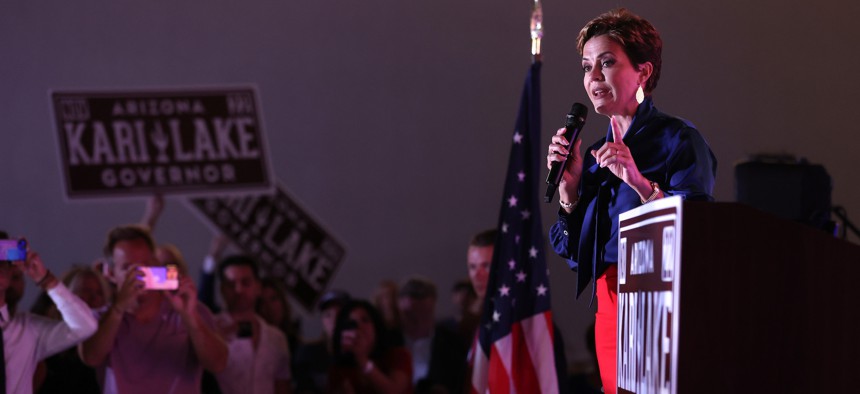Meet the Breakout Stars of the 2022 Governors’ Races

Republican candidate for Arizona Governor Kari Lake speaks to supporters that are waiting around as ballots continue to be counted during her primary election night gathering at the Double Tree Hotel on August 03, 2022 in Scottsdale, Arizona. Lake is one of the 15 major-party candidates for governor who have never held elected office. Justin Sullivan via Getty Images
COMMENTARY | Media experience rather than previously holding elected office is becoming a premium trait for candidates running for governor.
As the host of “Beyond Belief” on the Oprah Winfrey Network, Wes Moore, Maryland’s Democratic gubernatorial candidate, narrated strange-but-true tales such as that of a young woman born without arms who learned to fly a plane by herself. As a longtime Phoenix news anchor, Kari Lake, Arizona’s Republican gubernatorial candidate, narrated some of Arizona’s biggest news stories with authority before her strange-and-dubious social media posts made her a lightning rod.
Come next year, both Moore and Lake could be living in governor’s mansions. They are among the 15 major-party candidates for governor (among the 44 non-incumbents) who have never held elected office. Alongside former White House press secretary Sarah Huckabee Sanders, who’s the prohibitive favorite in Arkansas, Michigan underdog Tudor Dixon and New Mexico challenger Mark Ronchetti, Lake and Moore are part of a crop of gubernatorial contenders who’ve spent more time in front of cameras and microphones than behind the dais of a city council, school board or other governing body.
Dixon sharpened her rhetorical skills as the anchor of weekly program America's Voice Live on Real America's Voice until she declared her candidacy for governor of Michigan. Ronchetti beamed into thousands of New Mexico homes as the chief meteorologist for Albuquerque’s CBS and FOX affiliates. Neither is favored to win their race against incumbent Democrats.
Until fairly recently, the path to a state’s top job was usually a slog through local government, then maybe a stint in the legislature or as state attorney general. And in many states still, governors punched their tickets in Congress or lesser statehouse positions before seeking the top jobs. But increasingly, with a former reality television star having been elected to the presidency, other media-savvy outsiders are positioned to capture governor’s offices.
Lake, who is pulling ahead in swing-state Arizona, may be the most surprising case. When she announced her candidacy for governor in June 2021, most pundits and political donors didn’t take her seriously over her establishment Republican opponent. Democrats dismissed her as an neophyte extremist who would be easy to beat. Her insistence that the 2020 presidential election had been stolen from Donald Trump was seen as disqualifying. But Lake leaned into media coverage, even negative coverage, with self-assuredness befitting a long-time media personality. Meanwhile, her Democratic opponent Katie Hobbs campaigned as though allergic to cameras, and refused to participate in the “spectacle” of a debate with Lake.
Memo to Katie Hobbs: The spectacle will find you whether you seek it or not.
Going back at least as far as 1960, the more media-savvy presidential candidate has usually won: John F. Kennedy, Ronald Reagan, Bill Clinton and Donald Trump, to name a few. It’s taken longer for the phenomenon to trickle down to governor’s races, but with the elections of former pro wrestler Jesse Ventura to lead Minnesota in 1998 and Arnold Schwarzenegger in California five years later, a new model of state leader arrived.
While Schwarzenegger and Ventura were seen as outliers, they may be harbingers of the new era of gubernatorial candidates where simply paying your dues in local government is no longer enough. A flashy outsider may not appreciate the complex relationships among levels of government – from Medicaid reimbursements to emergency management to paying for public education. That can be detrimental to government actually getting things done. It’s notable that both Schwarzenegger and Ventura left office with low approval ratings.
That doesn’t mean voters won’t continue to elect candidates like them. Media-savvy outsiders come with high name recognition and no record of tough votes or controversial tenures to attack. While state jobs will never bring the level of media scrutiny of the White House, candidates who are at ease in front of a camera almost always have an advantage over those who are not.
Take Wes Moore, for example. Barring a major surprise, he’ll be the next governor of Maryland. Having won a close-fought Democratic primary against a former U.S. labor secretary and the sitting state comptroller, Moore is the prohibitive favorite over hard-right politician Dan Cox. A Rhodes Scholar, best-selling author and TV host and producer, the 44-year-old Moore speaks with the precision of a series of bullet points wrapped in a ready-made smile.
Along with the 40-year-old Sanders, the former Trump spokeswoman making her first run for elected office, Moore is nearly certain to end up in the governor’s office next year. It’s not hard to envision them sharing a presidential debate stage – that is, unless other TV-ready outsiders stand in their way.
James Nash, a senior vice president at ROKK Solutions, is a former statehouse reporter in Ohio, California and New Jersey who most recently served as the press secretary for the bipartisan National Governors Association.
NEXT STORY: Who Sees What You Flush? Wastewater Surveillance for Public Health is on the Rise





